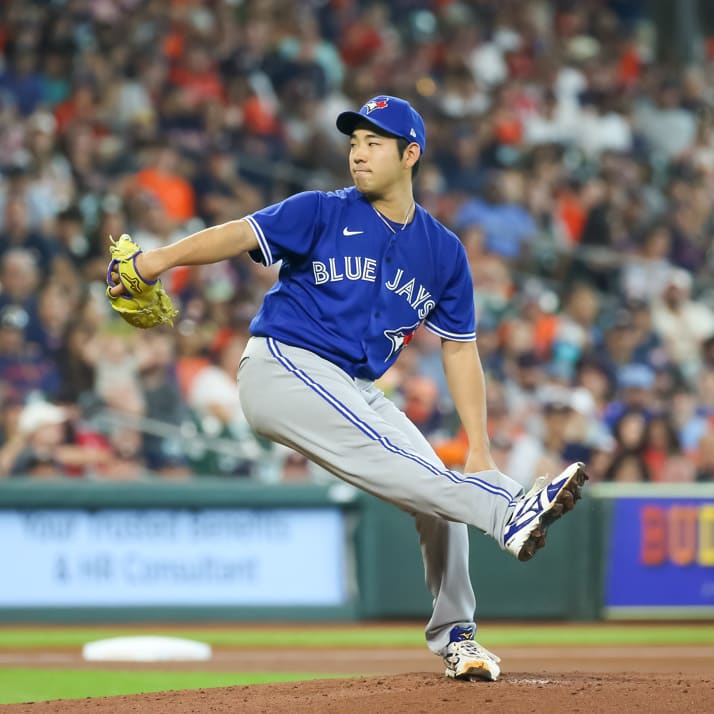This article is part of our The Long Game series.
Well, that was fun.
Especially for owners in only formats, this year's trade deadline was easily the most exciting in recent memory. Multiple big-name players switched leagues, with most of the traffic headed to the AL, and multiple players had their job descriptions radically altered by deadline deals, whether it was closers moving into set-up roles or heralded prospects like Michael Conforto suddenly losing their starting gigs in the majors.
Now that the dust has settled a bit, it's a good time to take a step back and see what lessons can be drawn from this season's deadline chaos, to better prepare for whatever chaos future seasons have to offer.
Re-Examining FAAB Strategy
I have been a long-time proponent of a "small ball" strategy when it comes to spending FAAB dollars in keeper leagues. Bidding early gives you a better chance of acquiring a player at a keepable price tag, as you can pick up players before they establish themselves in premium roles, and also gives you more value for your buck as you can get more at-bats and innings out of a May acquisition that pans out than you do from a buy in early August. Pursuing this strategy leaves your budget fairly tapped out by the time the trade deadline rolls around, however, and as an owner in a very competitive AL-only league, the downside of this approach hit me like a ton of bricks this year. The teams that hoarded their money were the ones competing for
Well, that was fun.
Especially for owners in only formats, this year's trade deadline was easily the most exciting in recent memory. Multiple big-name players switched leagues, with most of the traffic headed to the AL, and multiple players had their job descriptions radically altered by deadline deals, whether it was closers moving into set-up roles or heralded prospects like Michael Conforto suddenly losing their starting gigs in the majors.
Now that the dust has settled a bit, it's a good time to take a step back and see what lessons can be drawn from this season's deadline chaos, to better prepare for whatever chaos future seasons have to offer.
Re-Examining FAAB Strategy
I have been a long-time proponent of a "small ball" strategy when it comes to spending FAAB dollars in keeper leagues. Bidding early gives you a better chance of acquiring a player at a keepable price tag, as you can pick up players before they establish themselves in premium roles, and also gives you more value for your buck as you can get more at-bats and innings out of a May acquisition that pans out than you do from a buy in early August. Pursuing this strategy leaves your budget fairly tapped out by the time the trade deadline rolls around, however, and as an owner in a very competitive AL-only league, the downside of this approach hit me like a ton of bricks this year. The teams that hoarded their money were the ones competing for Johnny Cueto, Cole Hamels and Troy Tulowitzki, and I was left hoping they would all forget about someone like Mike Fiers and I could sneak through a bid on him. (Spoiler alert: they didn't, and I couldn't.)
Does that mean the "small ball" strategy is flawed? I still don't think so, for a few reasons:
1. Overall value. Even if you're not landing a big name at the deadline, you can still add more cumulative value from early season bids on lesser names. Who will add more saves overall to their ledger, the person who picked up Carson Smith in late April before he'd notched his first save, or the person who picked up Alex Wilson after Joakim Soria got traded? Is four-plus months of Marco Estrada worth more than two months of Hamels? We'll find out, but Hamels will need to pitch very well to make up the deficit given Estrada's head start.
2. Keeper value. Regardless of who gets more saves in 2015, a $5 Smith is a definite asset as a keeper while a $30 Wilson isn't. Unless you are all-in going for a title, keeper considerations have to be a factor in your thinking when spending FAAB
3. Trade value. In fact, even if you are all-in on the current season, there are still reasons to bid small and early rather than bid and late. So what if you miss out on Cueto and Tulo? There's no guarantee that the winning bids for those players will be your direct competitors. In a competitive league, also-ran teams will also spend big at the deadline to acquire assets that they can then trade to improve their core for next season. That $5 Carson Smith, or other keepable assets you have stored away, can quickly be converted into a $50 Tulowitzki with a post-deadline trade if Tulo was bought to be flipped.
Of course, the success of the strategy depends on you actually hitting on the players you buy, but that's true of any strategy. Despite the increased activity level at this year's deadline, something that could become a trend as the league continues to adjust to two wild-card spots per league, I still believe small ball is the way to go. Only under one specific set of circumstances (you spend your money early with little to show for it, a lot of the big-name players are added to the pool at the deadline, and they're all bought by your competition) does it go wrong for you, and if that much is going wrong for you in a given season you should probably be thinking about next year anyway.
Have A Plan B
In that competitive AL-only league, one team has staked out a strong position at the top of the standings, but five of us are still competing for the remaining three spots in the money, with two other teams still on the fringes of the race. Knowing I was probably going to be shut out in FAAB at the deadline, I reached out to the two teams on the fringes to see if they were committed to making a run or not. One of the two said he was still going for a money finish, but only if he was able to add important pieces through FAAB. If not, he's probably have to dump. I commiserated, we discussed the general parameters for what a dump deal between us might look like ... and then I left things alone until after the league's FAAB results got released. Sure enough, he got shut out, and a couple of hours later we had a deal that frankly got me a bigger upgrade than I could have gotten just from adding one of the deadline's big free agents.
While this in general falls under the category of "keeping your communication lines open," I think there's a bigger lesson to be drawn here. Too often it's easy to get invested in One True Plan that will help your team, whether it's a specific player who will solve all your roster problems if you can land him through FAAB, or a trade with a specific partner that will put you over the top. If that plan falls apart, it's important to have a Plan B (and even a Plan C) already in place that you can pivot to, rather than going all the way back to square one to come up with another One True Plan. In this case, both of us had Plan B's that worked out: I got a big talent infusion, and he got a bargain-priced Corey Kluber with one more year left on his contract in exchange for the dying embers of his current season.
Plan B might not as good as your OTP, but every week that ticks by in a fantasy league represents a lost opportunity cost. As with FAAB buys, it's often better to make a good move now than it is to make a great move sometime down the road.
Deadlines Are Getting More Volatile
I alluded to this earlier, but the likelihood is that this year's flurry of big moves will start to look like the norm rather than the exception. With two wild card spots in each league, more teams can convince themselves that they're still in the hunt. Now in some cases, that can mean a team hesitates when they should be dumping (I'm looking at you, White Sox ... I was counting on Jeff Samardzija heading back to the NL, dammit), but overall it should mean than more teams are buyers than sellers, and more players will be changing hands and switching leagues. This year's deadline activity could be the peak of the chaos, or it could end up looking like the few few spatters of rain on your window in advance of a storm.
What increased volatility means for keeper league owners is that you'll need to learn to prepare and adapt to big changes in the player pool. Have those Plan B's ready. If you're making a run, make sure you have a couple of desirable keepers stockpiled, just in case a deal falls into your lap as a result of all the deadline turmoil. If you're rebuilding, look for opportunities to take advantage of desperate win-now owners who don't have Plan B's and aren't sure how to respond when their competition all adds big-name players and they don't.
And, if you're in an only format that doesn't count stats for players traded out of the player pool, lobby as hard as you can to get that rule changed. It's one thing to lose a title because you got outmaneuvered by your rivals. It's quite another to lose a title because both your aces got traded to the other league and you have nothing to show for them. That kind of out-of-your-control randomness should not determine who takes home the pennant in a fantasy league.









